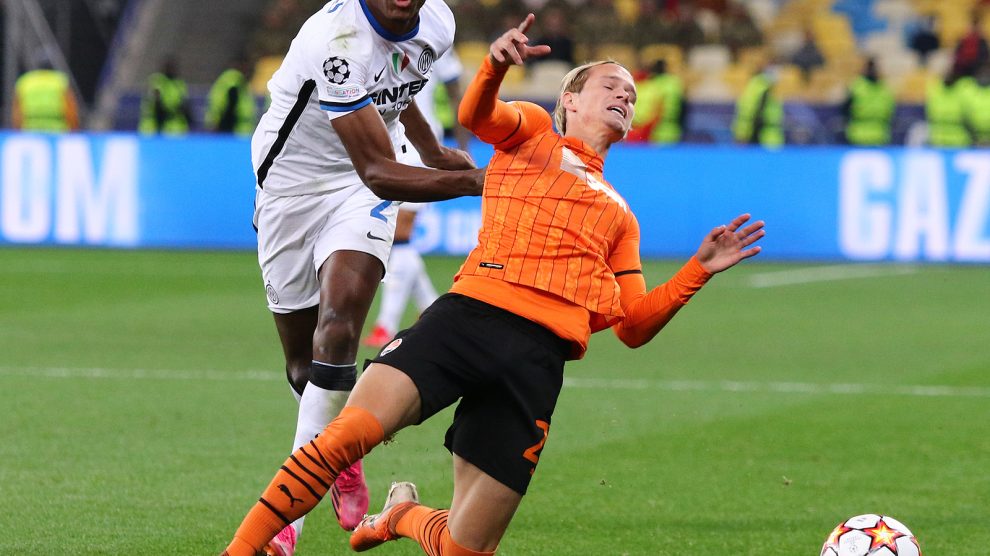Footballers may currently be Ukraine’s top export to the UK, but a ruling last month by the Court of Arbitration for Sport means the country’s clubs will miss out on tens of millions of euros.
Mykhailo Mudryk has yet to set the Premier League alight. The Ukrainian footballer has so far made just two appearances for his new club, Chelsea – one a promising if hit and miss cameo in a match against Liverpool, the other an utterly forgettable 45 minutes last Friday against Fulham.
- Amid an ongoing war, sport returns to Ukraine
- Zorya Luhansk seems immune to the wave of Ukrainisation in football
- Tales waiting to be told: Football in Eastern Europe
Indeed, so poor was the 22-year-old in the Fulham game that he was substituted at half-time. “He’s had a really heavy cold, this week he’s suffered with that,” said Graham Potter, the Chelsea coach, by way of an excuse for Mudryk’s poor performance.
Which begs the question: If he was that ill, why did he start the match in the first place? Perhaps Potter was simply protecting his expensive new signing, bought from Shakhtar Donetsk in Ukraine for 100 million euros in January.
Mudryk, a forward, was not the only Ukrainian to arrive in the Premier League last month. Bournemouth paid Dynamo Kyiv 22.5 million euros for Ilia Zabarnyi, a central defender. Given that in 2021 the UK imported a total of 830 million UK pounds worth of goods from Ukraine, it’s a fair assumption that the fees paid for Mudryk and Zabarnyi made footballers the leading Ukrainian export to the UK in January, well ahead of iron and steel.
Mudryk’s sale also brought a windfall for Ukraine’s armed forces. Shakhtar Donetsk’s president, Rinat Akhmetov, donated 25 million US dollars of the fee received from Chelsea for the transfer of Mudryk to the “Heart of Azovstal”, a project aimed to help families of fallen soldiers in Ukraine.
Azovstal is Akhmetov’s steel plant in Mariupol, where Ukrainian fighters defied weeks of Russian bombardment before the city fell in May. Azovstal has become a symbol of bravery, endurance and the indomitable spirit of the Ukrainian people.
“I want to thank the entire civilised world for helping Ukraine,” Akhmetov – Ukraine’s richest person – said when making the donation. “We can only talk about Ukrainian football because of the Ukrainian army, the Ukrainian people and the tremendous support we have had during this incredibly difficult time. And the only way we can defeat the evil that has come to our homes is by working together.”
Akhmetov admitted that he had mixed feelings over the sale of Mudryk. “I am happy for Mykhaylo and very proud of him. He has shown that talent and hard work can make the impossible possible. And I have no doubt he will shine at Chelsea and across Europe.
“On the other hand, I have never made it a secret that my dream is to win European trophies. This means that we need players like Mykhaylo in Ukrainian clubs, competing at the European level. Unfortunately, that is impossible at the moment, because of this unjust war being waged against us by the Russian Federation.
“But I remain utterly confident we will defeat the aggressor. One of the things I look forward to most after our victory is Mykhaylo returning with his Chelsea team for a friendly match in Donbass Arena in a Ukrainian Donetsk.”
Players for nothing
The windfall that Ukrainian clubs have received from player sales this season might have been far higher had football’s governing body, FIFA, not ruled shortly after Russia’s invasion that foreign players and coaches could suspend their contracts until the end of June 2023 and leave Ukrainian clubs without a transfer fee being paid.
Brazilian midfielder Tetê, now playing for Premier League side Leicester City, and the Israeli Manor Solomon, at Fulham, are just two of the Shakhtar players who would have commanded high transfer fees had FIFA not ruled they could leave for nothing.
While the players are obliged to return to Shakhtar – a club which over the past two decades has become well known for its ability to nurture young talent, both Ukrainian and foreign – at the end of June, it is likely that the suspension will be extended should there be no end to the war.

‘Unprecedented circumstances’
In January, the Court of Arbitration for Sport (CAS) upheld FIFA’s decision to allow foreign players and coaches to leave Ukrainian clubs. Shakhtar had sought 50 euros million compensation from FIFA for loss in player transfer sales. FIFA claimed its decision was in the interest of players who “need to earn a salary”.
The CAS panel agreed, determining that in all cases the Russian invasion of Ukraine and the worldwide response “created unforeseen and unprecedented circumstances to which FIFA and UEFA [European football’s governing body] had to respond”.
Shakhtar, who have been forced to play home matches in exile – first in Lviv and since 2020 in Kyiv – continue to believe that they have been wronged.
“FIFA had a responsibility to help and support Ukrainian football during the war and instead its actions plunged the local football community into an even greater crisis,” it said in a statement.
The money received from Chelsea for Mudryk will do little to lessen the sense of injustice that the club, as with Ukrainian football as a whole, is being penalised for Russia’s invasion.
Photo: Mykhailo Mudryk (in orange) playing for Shakhtar Donetsk.
Unlike many news and information platforms, Emerging Europe is free to read, and always will be. There is no paywall here. We are independent, not affiliated with nor representing any political party or business organisation. We want the very best for emerging Europe, nothing more, nothing less. Your support will help us continue to spread the word about this amazing region.
You can contribute here. Thank you.







Add Comment